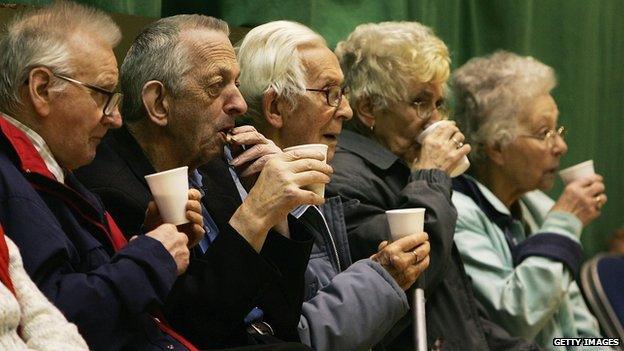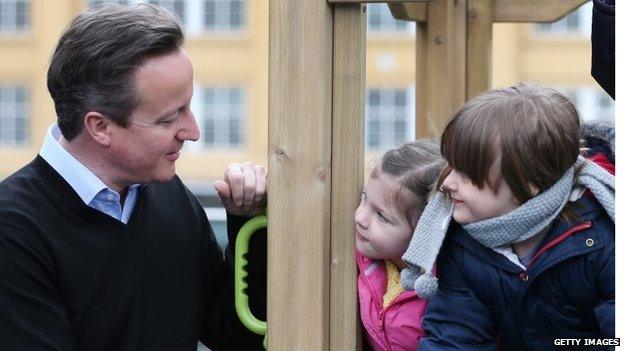Pension freedoms based on 'uncertain assumptions'
- Published

More choice for pensioners in the Budget - but at what cost to the taxpayer?
The Budget's pension changes are based on "highly uncertain assumptions", according to a respected think-tank.
The Institute for Fiscal Studies (IFS) questioned estimates about the increased tax revenue the new scheme would initially generate.
But it said the plan was "one of the biggest shake ups seen in a long time".
IFS Director Paul Johnson said the liberalisation had clear advantages and would give pensioners new freedoms to make choices over their own affairs.
He added: "It will likely increase the incentive to save in a pension."
Chancellor George Osborne expects the pension changes to increase government revenues, at least in the first few years, because more people will be able to make taxable withdrawals from their funds.
The government predicts increased income tax receipts of up to £1.2bn in 2018-19, based on an assessment that 30% of people in defined pension contribution schemes will opt to take out their pension at a faster rate than via an annuity.
'More expensive'
But Mr Johnson, said that "depends on highly uncertain behavioural assumptions about when people take the money".
The IFS calculates that the increased tax receipts will peak in 2018/19 and then decline. Within 20 years the policy will actually be increasing the deficit.
The chancellor's changes are partly a response to worries that annuities - the most common option for current pensions, which offer a guaranteed income for life - are not giving customers the best value for money.
But Mr Johnson said the new rules could create even bigger problems.
"It will likely make annuities even more expensive for those who do want to buy them.
"The market will become much thinner and there will be greater levels of adverse selection - only those expecting to live a long time will want to buy an annuity, thereby driving up the price.

More generous child care, but the IFS wonders if it makes a difference
Permanent give-away
Gemma Tetlow IFS director of pensions, saving and public finances research said: "The chancellor has been getting into some bad habits of late with a series of policies that weaken and increase the risk to the long run public finances.
"In this latest budget he has a £5bn permanent give-away matched by temporary takeaways and uncertain cuts to spending."
The IFS also said that increased choice for pensioners in the way they managed their pensions could lead to more mistakes.
People aged 60 or 65 are known to underestimate their own life expectancy and especially the likelihood of living to extreme old age, he explained.
The chancellor has dismissed fears people might "blow" their pension pots, adding that pensioners were "responsible people who are capable of making decisions about their future".
An extension to tax-free childcare has also been criticised by the IFS. The scheme has "been made more generous but magically, at no extra cost," Mr Johnson said.

Smokescreen - increasing tax on smokers brings in far less than it should
IFS Senior Research Economist David Phillips said that it was debatable whether £7bn spent annually on child care was money well spent, "as there is little evidence as to whether it increases adult employment or improves children's outcomes."
'Chopping and changing'
The IFS said that some of the tax increases would not be as effective as they appeared. An increase in the tobacco duty should in theory raise an extra £795m .
But it said the real number it is only likely to raise £135m because smokers will respond to the increase by cutting down, giving up or smuggling cigarettes.
Mr Johnson praised the "consistency" in increases to personal income tax allowances, and reductions in corporation tax, but criticised "chopping and changing" in business policies like investment allowances.
Cuts in savings taxes were also welcomed, but Mr Johnson concluded the Budget still "leaves us with as little sense as we had before of quite how the very large public spending cuts still in the pipeline will actually be delivered".